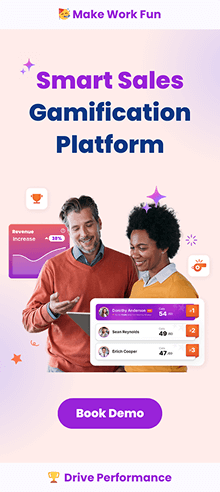A strong company culture isn’t just a buzzword—it’s the lifeblood of successful organizations. In 2025, company culture is no longer an afterthought but a deliberate strategy for retaining top talent, fostering innovation, and achieving business goals. With remote and hybrid workforces becoming the norm, organizations face new challenges in maintaining a cohesive, motivated, and aligned team.

Technology, particularly AI-powered tools, is revolutionizing how businesses nurture their culture. Spinify, a leader in gamified performance solutions, offers cutting-edge tools like its AI Coaching Agent to help companies create a thriving, engaged workplace. In this article, we’ll explore actionable strategies, real-world examples, and how Spinify can help you build a company culture that stands out in 2025.
What Defines a Strong Company Culture?
A strong company culture is the shared set of values, beliefs, behaviors, and practices that shape how an organization operates. It’s reflected in everything from how employees communicate to how decisions are made and successes are celebrated. In 2025, with the rise of remote and hybrid work environments, fostering a positive sales culture that aligns with company values becomes even more crucial. A strong culture not only helps in achieving business goals but also in creating a sense of belonging and purpose among employees.
Key Elements of a Strong Culture
- Clear Mission and Values: A unified purpose that resonates with employees is foundational. When employees understand and embrace the company’s mission and values, they are more likely to be engaged and motivated. This alignment helps in driving a consistent and focused approach toward achieving the organization’s goals.
- Open Communication: A culture where feedback flows freely encourages transparency and trust. Open communication channels ensure that employees feel heard and valued, leading to increased collaboration and innovation. In a remote setting, leveraging technology to maintain effective communication is essential for sustaining a cohesive team dynamic.
- Employee Recognition: Acknowledging and celebrating achievements is vital for maintaining morale and motivation. Recognizing employees’ contributions fosters a culture of appreciation and encourages continuous performance improvement. This can be achieved through gamification strategies, where employees receive points and rewards for their accomplishments.
- Collaboration: Teams working together toward shared goals create a synergistic environment. Collaborative efforts lead to more innovative solutions and a stronger sense of community within the organization. Encouraging healthy competition through sales contests and gamified leaderboards can enhance teamwork and drive collective success.
- Growth Opportunities: Providing paths for personal and professional development is crucial for retaining top talent. Employees are more likely to stay with companies that invest in their growth and offer opportunities for advancement. Implementing ongoing learning and development programs, supported by AI-powered coaching and gamification elements, can help in nurturing a high-performance sales culture.

By focusing on these key elements, organizations can build a strong, resilient company culture that adapts to the challenges of 2025 and beyond. Integrating game design elements and leveraging technology effectively can transform the workplace into an engaging and rewarding environment, ultimately leading to sustained success and growth.
Why Company Culture Matters More Than Ever in 2025
In today’s competitive job market, cultivating a robust company culture is more than just an advantage—it’s a necessity. Organizations with well-defined cultures consistently report higher employee retention rates, increased productivity, and superior financial outcomes. As we move into 2025, the prevalence of remote work makes nurturing a sense of belonging and engagement even more crucial. A strong company culture not only attracts top talent but also ensures that employees feel valued and aligned with the company’s mission.
The Challenges of 2025
- Remote Workforce Dynamics: With teams spread across various locations, maintaining cohesion and collaboration can be challenging. It’s essential to create a unified culture that transcends physical boundaries, ensuring that every team member feels connected and part of the larger mission.
- Employee Burnout: As the lines between work and home blur, addressing mental health and emotional well-being becomes paramount. Organizations must be proactive in supporting their employees’ mental health to prevent burnout and foster a healthy work-life balance.
- Talent Retention: In an increasingly competitive market, standing out as an employer of choice requires more than just competitive salaries. Companies must offer a compelling culture that resonates with employees, providing them with a reason to stay and grow within the organization.

To navigate these challenges, organizations must leverage innovative tools and strategies. AI-powered solutions, such as Spinify’s platform, offer a modern approach to building and sustaining a strong company culture. By integrating gamification elements, real-time feedback, and personalized coaching, these platforms help create an engaging and supportive work environment that adapts to the evolving needs of the workforce in 2025.
The Role of Leadership in Shaping Culture
Leadership sets the foundation for a strong company culture. Leaders must not only articulate the organization’s mission and values but also embody them in their actions. Employees look to leaders as role models, and consistent behavior aligned with company principles fosters trust and engagement. For example, companies like Microsoft emphasize leadership development programs to ensure managers are equipped to inspire and support their teams. Spinify complements this by empowering leaders with data-driven insights and real-time feedback through its AI Coaching Agent, enabling them to guide their teams effectively.
Empowering Employees with Ownership
A strong company culture thrives when employees feel a sense of ownership over their roles and contributions. Empowerment fosters accountability, creativity, and commitment to organizational goals. Encouraging employees to take initiative and participate in decision-making builds a deeper connection to the company’s mission. Tools like Spinify’s gamified leaderboards reinforce this sense of ownership by allowing team members to track their progress in real time, fostering healthy competition and collaboration. When employees can see their impact visually and celebrate milestones, they’re more likely to stay engaged and motivated.
Measuring and Improving Culture with Analytics
In 2025, data is a critical tool for understanding and enhancing company culture. Analytics can provide insights into employee engagement, productivity, and satisfaction, helping leaders identify areas for improvement. Spinify’s real-time analytics go a step further by integrating performance metrics with employee well-being tracking. This combination ensures organizations not only hit their business targets but also maintain a positive and supportive work environment. By leveraging these insights, managers can proactively address challenges, celebrate wins, and continuously refine their culture-building strategies.

Sustainability and Purpose-Driven Culture
Employees today seek more than just a paycheck—they want to be part of organizations that align with their values and contribute to a greater purpose. Building a purpose-driven culture involves integrating sustainability initiatives, community engagement, and ethical practices into the company’s DNA. Businesses like Google are renowned for fostering purpose by promoting environmental responsibility and innovation. Similarly, Spinify can help reinforce purpose-driven goals by gamifying sustainability initiatives, such as rewarding teams for reducing waste, volunteering hours, or achieving social impact targets. This approach not only enhances culture but also creates a positive ripple effect beyond the workplace.
How Spinify Helps Build a Strong Company Culture
Spinify combines gamification, AI-powered coaching, and real-time feedback to foster a culture of engagement, recognition, and continuous growth. By turning work into an engaging and rewarding experience, Spinify helps teams stay aligned and motivated. In 2025, as companies navigate the complexities of remote and hybrid work environments, tools like Spinify become invaluable in maintaining a cohesive and vibrant company culture.
Gamified Leaderboards and Recognition
Spinify’s gamified leaderboards make tracking and celebrating performance fun and engaging. Employees see their progress in real time, fostering friendly competition and collaboration. This approach not only motivates individuals but also encourages a sense of camaraderie among team members, driving them towards common goals. By integrating game design elements, such as points and badges, Spinify transforms routine tasks into exciting challenges that employees eagerly participate in.
- How It Helps: Celebrating milestones boosts morale and creates a culture of appreciation. Employees feel valued and recognized for their contributions, which enhances job satisfaction and loyalty.

AI Coaching Agent for Growth and Support
Spinify’s AI Coaching Agent automates personalized coaching, offering real-time feedback and tailored development plans. This feature ensures that employees receive the guidance they need to excel in their roles, while also freeing up managers to focus on more strategic tasks. The AI Coaching Agent adapts to individual learning styles and career goals, providing a customized growth experience that aligns with company values and objectives.
- How It Helps: Employees feel supported in their growth, and managers save time by automating routine coaching tasks. This leads to a more efficient and productive workforce, as well as higher employee retention rates.
Wellness Pulse for Employee Well-Being
Spinify’s AI Coaching Agent also includes a feature that tracks emotional well-being, ensuring that employees are engaged and motivated without feeling overwhelmed. By monitoring stress levels and overall happiness, the Wellness Pulse feature allows organizations to proactively address potential burnout and foster a healthier work-life balance. This holistic approach to employee well-being is crucial in creating a positive sales culture that thrives under pressure.
- How It Helps: A balanced approach to performance and well-being reduces burnout and fosters loyalty. Employees are more likely to stay with a company that prioritizes their mental and emotional health, leading to a more stable and committed workforce.
By integrating these features, Spinify empowers organizations to build strong, adaptive cultures in 2025 and beyond. The combination of gamification, AI-driven insights, and a focus on well-being creates an environment where employees feel motivated, engaged, and valued, ultimately driving business success and growth.
Tips for Building a Strong Company Culture in 2025
1. Define and Communicate Your Core Values
Every organization needs a clear mission and set of values. Employees should understand not just what they do but why they do it. By clearly articulating your company’s core values, you create a guiding framework that influences decision-making, behaviors, and the overall work environment. This clarity helps employees align their personal values with the company’s mission, fostering a deeper connection and commitment to their roles.
- Actionable Tip: Use town halls or team meetings to discuss and reinforce your company’s mission and values regularly. Incorporate these values into daily operations and decision-making processes to ensure they are lived and not just stated.
- How Spinify Can Help: Gamify values-based initiatives to encourage participation and alignment. By integrating gamification elements, such as points and rewards, employees are motivated to engage with and embody the company’s values actively.

2. Foster Open Communication
Transparency builds trust. Employees should feel comfortable sharing feedback and discussing challenges. Open communication channels empower employees to voice their opinions, contribute ideas, and feel valued as part of the team. This openness leads to better problem-solving, innovation, and a more cohesive team dynamic.
- Actionable Tip: Implement regular one-on-one check-ins and anonymous feedback channels. Encourage managers to actively listen and act on the feedback to demonstrate that employee voices are heard and respected.
- How Spinify Can Help: Use the AI Coaching Agent to gather insights and deliver actionable feedback. This tool can help identify communication barriers and provide tailored solutions to enhance transparency and trust within the organization.
3. Recognize and Reward Achievements
Celebrating small wins can have a big impact on morale. Recognition shows employees that their work matters and encourages a culture of appreciation. By acknowledging achievements, organizations can boost employee motivation, satisfaction, and loyalty, ultimately leading to higher productivity and reduced turnover.
- Actionable Tip: Create a rewards system for meeting milestones or embodying company values. Consider using various mediums, such as newsletters, social media, or internal platforms, to publicly recognize achievements and inspire others.
- How Spinify Can Help: Use gamified leaderboards to publicly recognize achievements in real time. This approach not only highlights individual accomplishments but also fosters a sense of healthy competition and camaraderie among team members.

4. Prioritize Employee Well-Being
Burnout is a real threat, especially in remote or hybrid work settings. Organizations must address mental health and stress proactively to maintain a healthy and productive workforce. By prioritizing well-being, companies can create a supportive environment where employees feel cared for and motivated to perform their best.
- Actionable Tip: Offer mental health days and encourage a healthy work-life balance. Provide access to wellness resources, such as counseling services or stress management workshops, to support employees’ mental and emotional health.
- How Spinify Can Help: Leverage the Wellness Pulse feature to monitor team well-being. This tool provides valuable insights into employee stress levels and overall happiness, allowing organizations to take proactive measures to prevent burnout and foster a positive work environment.
5. Invest in Professional Development
Employees are more likely to stay with companies that invest in their growth. Offering opportunities for personal and professional development shows employees that the organization values their future and is committed to helping them achieve their career goals.
- Actionable Tip: Provide access to learning resources and mentorship programs. Encourage employees to set development goals and offer support in achieving them through training sessions, workshops, or online courses.
- How Spinify Can Help: Spinify’s AI Coaching Agent delivers personalized growth plans, fostering continuous learning. By tailoring development opportunities to individual needs, employees can enhance their skills and advance their careers, contributing to a high-performance sales culture.
6. Embrace Diversity and Inclusion
A diverse workforce fosters innovation and creativity. Building an inclusive culture where everyone feels valued and respected is essential for attracting and retaining top talent. By embracing diversity, organizations can benefit from a wide range of perspectives and ideas, driving innovation and business success.
- Actionable Tip: Celebrate cultural events and establish diversity committees. Promote diversity and inclusion initiatives through training programs and awareness campaigns to ensure all employees feel included and appreciated.
- How Spinify Can Help: Use gamification to drive participation in inclusion initiatives. By incorporating game mechanics, such as challenges and rewards, organizations can engage employees in diversity efforts and promote a more inclusive workplace culture.
How AI is Transforming Company Culture
Artificial Intelligence (AI) is not just a technological advancement; it’s a transformative force reshaping how businesses engage and support their workforce. With its ability to analyze vast amounts of data and deliver personalized insights, AI offers powerful tools for building a robust and adaptive company culture. In 2025, AI’s role in enhancing corporate culture is more critical than ever, as it addresses the challenges posed by remote and hybrid work environments.

Real-Time Feedback with AI
AI technology eliminates the traditional delays between employee actions and managerial recognition, providing instant feedback that keeps employees motivated and engaged. This immediacy helps maintain momentum and ensures that achievements are celebrated promptly, fostering a culture of continuous improvement and appreciation.
- Example: Companies like Gong.io utilize AI to analyze sales calls, offering actionable coaching insights that enhance performance. Similarly, Spinify’s AI Coaching Agent provides real-time feedback and insights to both employees and managers, ensuring that everyone is aligned and aware of their progress and areas for improvement.
Personalized Development Plans
AI’s ability to tailor coaching and development programs to the individual needs of employees ensures that each person feels supported and valued within the organization. By identifying specific skill gaps and career aspirations, AI helps create personalized growth paths that align with both the employee’s goals and the company’s objectives.
- Example: HubSpot leverages AI to suggest personalized learning paths for employees, enhancing their skills and career development. Spinify offers a similar experience through gamified coaching, where employees are engaged in their growth journey through interactive and rewarding learning experiences.
Proactive Well-Being Tracking
AI’s capacity to monitor stress and engagement levels in real-time enables organizations to proactively address challenges before they escalate into significant issues. By keeping a pulse on employee well-being, companies can create a supportive environment that prioritizes mental health and work-life balance.

- Example: Google uses AI-powered analytics and surveys to monitor employee well-being, ensuring that any issues are addressed promptly. Spinify’s Wellness Pulse feature brings this concept into gamified environments, allowing organizations to track and enhance employee well-being through engaging and interactive methods.
By integrating AI into their cultural strategies, organizations can create a dynamic and responsive work environment that not only meets the needs of their employees but also drives business success. AI’s role in transforming company culture is indispensable, offering innovative solutions that foster engagement, development, and well-being in the modern workplace.
How Leading Companies Prioritize Company Culture
In 2025, leading companies understand that a strong company culture is integral to their success. By prioritizing company values, employee engagement, and innovation, these organizations set themselves apart in the competitive business landscape. Let’s explore how some of the top companies are fostering a thriving culture that aligns with their strategic goals.
Microsoft
Microsoft is a classic example of a company that emphasizes continuous learning and development. Recognizing that a well-trained workforce is a powerful asset, Microsoft invests in extensive training programs and mentorship opportunities for its employees. These initiatives not only enhance employees’ skills but also empower them to take ownership of their career growth. By offering structured learning paths and resources, Microsoft ensures that its workforce remains at the forefront of technological advancements.
- Takeaway: Focus on growth opportunities to retain top talent. Providing avenues for personal and professional development fosters loyalty and helps maintain a high-performance sales culture.
Google’s corporate culture is renowned for its emphasis on innovation and employee well-being. The company promotes open communication, encouraging employees to share ideas and feedback freely. This transparency builds trust and fosters a collaborative environment where creativity can flourish. Additionally, Google prioritizes mental health through various initiatives, including wellness programs and flexible work arrangements. By addressing the holistic needs of its employees, Google creates a supportive atmosphere that drives productivity and satisfaction.
- Takeaway: Encourage transparency and prioritize mental health. A culture that values open dialogue and employee well-being contributes to a motivated and engaged workforce.
HubSpot
HubSpot is celebrated for its employee-centric culture, which combines flexibility and recognition to keep employees motivated. The company offers flexible work arrangements, allowing employees to balance their personal and professional lives effectively. HubSpot also leverages gamification strategies to celebrate achievements and maintain engagement. HubSpot creates a fun and dynamic work environment that encourages employees to excel.
- Takeaway: Use gamification to celebrate achievements and maintain engagement. Integrating game design elements into the workplace fosters a sense of healthy competition and camaraderie, leading to sustained employee motivation and loyalty.
By examining the strategies of these leading companies, other organizations can glean valuable insights into building a strong company culture in 2025. Prioritizing employee development, open communication, and innovative recognition methods can transform the workplace into a thriving environment where employees feel valued and motivated to contribute to the company’s success.
Building a Culture That Thrives in Remote Work
In 2025, remote and hybrid workforces require unique strategies to maintain a strong culture. With teams dispersed across different locations and time zones, fostering a cohesive and vibrant company culture demands intentional efforts and innovative solutions. Here are some best practices to ensure your remote teams remain engaged, motivated, and aligned with your company’s mission and values.
Best Practices for Remote Teams
- Frequent Communication: Establish regular communication protocols using tools like Microsoft Teams or Zoom. Schedule daily or weekly check-ins to keep everyone informed and connected. Encourage open dialogue and create spaces for informal interactions, such as virtual coffee breaks or team-building activities, to foster camaraderie and collaboration.
- Virtual Celebrations: Celebrate milestones and achievements online with team-wide recognition. Organize virtual events, such as award ceremonies or themed parties, to acknowledge individual and team accomplishments. Use different mediums, like videos or newsletters, to showcase successes and inspire others within the organization.
- AI-Powered Support: Leverage tools like Spinify’s AI Coaching Agent to provide personalized feedback and track well-being. Utilize AI-driven insights to tailor development plans and support employees’ growth. Implement wellness checks and stress management resources to ensure employees feel supported and maintain a healthy work-life balance.
- Encourage Flexibility and Autonomy: Empower remote employees by offering flexible work arrangements and encouraging autonomy in their roles. Trust your team to manage their schedules and deliver results, which can lead to increased job satisfaction and productivity. Provide clear expectations and goals to guide their efforts while allowing them the freedom to innovate and problem-solve.
- Foster a Sense of Belonging: Create opportunities for remote employees to connect and build relationships with their colleagues. Encourage participation in virtual team-building activities, mentorship programs, and interest-based groups. Promote diversity and inclusion initiatives to ensure all employees feel valued and respected, regardless of their location.
- Invest in Technology and Resources: Equip your remote teams with the necessary tools and resources to succeed. Invest in reliable technology, secure communication platforms, and collaborative software to streamline workflows and enhance productivity. Provide training and support to help employees adapt to new technologies and maximize their potential.
By implementing these best practices, organizations can build a thriving remote culture that aligns with their strategic goals and fosters a sense of belonging, engagement, and motivation among employees. Embracing the unique challenges and opportunities of remote work will enable companies to attract and retain top talent, drive innovation, and achieve long-term success in 2025 and beyond.
How Technology Enables Culture Across Borders
In an increasingly globalized world, where teams often span multiple countries and time zones, technology plays a crucial role in maintaining a unified company culture. As organizations continue to embrace remote and hybrid work models, leveraging the right technological tools becomes essential for fostering collaboration, communication, and a sense of belonging among dispersed employees.
Virtual Collaboration Tools
Platforms like Microsoft Teams, Zoom, and Slack are indispensable in today’s work environment, enabling teams to stay connected and collaborate seamlessly across distances. These tools facilitate real-time communication, video conferencing, and project management, ensuring that team members can work together effectively, regardless of their physical location. By providing a virtual space for interaction, these platforms help maintain a cohesive team dynamic and promote a culture of inclusivity and engagement.
- How Spinify Helps: Spinify enhances virtual collaboration by integrating gamified leaderboards that track and celebrate team achievements, no matter where team members are located. By adding gamification elements, such as points and badges, Spinify transforms routine tasks into exciting challenges, fostering a sense of healthy competition and camaraderie among employees.
AI-Driven Language Tools
AI technology has the power to bridge language gaps, ensuring that all employees feel included in company-wide communications. AI-driven language tools, such as real-time translation services, enable seamless interaction among team members who speak different languages. This inclusivity not only enhances communication but also strengthens the company’s global culture by valuing diverse perspectives and fostering mutual understanding.
- Example: Google Translate integration in tools like Gmail allows employees to communicate effortlessly across language barriers, promoting a more inclusive and collaborative work environment. By incorporating AI-driven language tools, companies can ensure that every employee, regardless of their native language, feels valued and connected to the organization’s mission and values.
Cloud-Based Workspaces
Cloud-based platforms like Google Workspace and Microsoft 365 allow remote teams to access files, collaborate on documents, and share resources seamlessly. These tools enable employees to work flexibly, supporting a culture of collaboration and innovation.
- How Spinify Enhances Cloud Collaboration: Spinify integrates with cloud-based workspaces to gamify daily tasks, making document collaboration and project management engaging. By rewarding contributions and achievements, Spinify fosters a culture of recognition and continuous improvement.
Embracing these technologies helps organizations build a robust company culture that transcends geographical boundaries, ensuring all employees feel connected and engaged, driving business success in an interconnected world.
Strategies for Onboarding New Employees
Onboarding is a critical phase that sets the tone for an employee’s entire journey within the company. A well-structured onboarding process ensures that new hires feel welcomed, supported, and aligned with the company’s culture and values right from day one. In 2025, with the increasing prevalence of remote and hybrid work environments, it’s more important than ever to have a robust onboarding strategy that caters to diverse needs and fosters a sense of belonging among new employees.
Create a Structured Onboarding Plan
A comprehensive onboarding plan should clearly outline the goals, expectations, and resources available to new hires. This includes providing them with the necessary tools, access to relevant information, and a clear understanding of their roles and responsibilities. A structured plan not only helps new employees acclimate quickly but also boosts their confidence and productivity.
- How Spinify Helps: Spinify enhances the onboarding experience by incorporating gamified challenges that make learning engaging and enjoyable. By adding gamification elements, such as points, badges, and leaderboards, Spinify turns the onboarding process into an interactive and rewarding journey. This approach not only motivates new hires but also encourages them to actively participate and engage with the company’s culture and values.

Introduce Company Values Early
Introducing company values early in the onboarding process ensures new employees align with the organization’s mission and culture. This involves values-based training sessions that emphasize these principles’ role in decision-making and shaping the workplace environment.
- Actionable Tip: Share examples of how company values influence daily operations and strategic decisions. Use various mediums, such as videos or case studies, to illustrate their impact on success and foster a positive work culture. Encourage new hires to reflect on how they can contribute to these values in their roles.
Implementing these strategies creates a supportive onboarding experience that aligns new employees with the company culture and values, enhancing engagement and retention. Leveraging tools like Spinify to gamify the process can make onboarding both fun and impactful.
Book Your Spinify Demo Today
In 2025’s dynamic business world, a strong company culture is essential for success. It fosters engagement, innovation, and growth, helping organizations attract and retain top talent. Building this culture requires effective tools and strategies.
Spinify offers gamified solutions and AI-powered coaching to transform your workplace into an engaging environment. With game design elements, real-time feedback, and personalized development plans, Spinify enhances recognition, motivation, and continuous improvement. Whether managing remote teams or enhancing collaboration, Spinify provides the resources for success.
Don’t leave your company culture to chance. Use Spinify’s platform to cultivate an environment where employees feel valued and motivated. Book Your Demo Now to see how Spinify can help you build a standout company culture in today’s competitive landscape.




